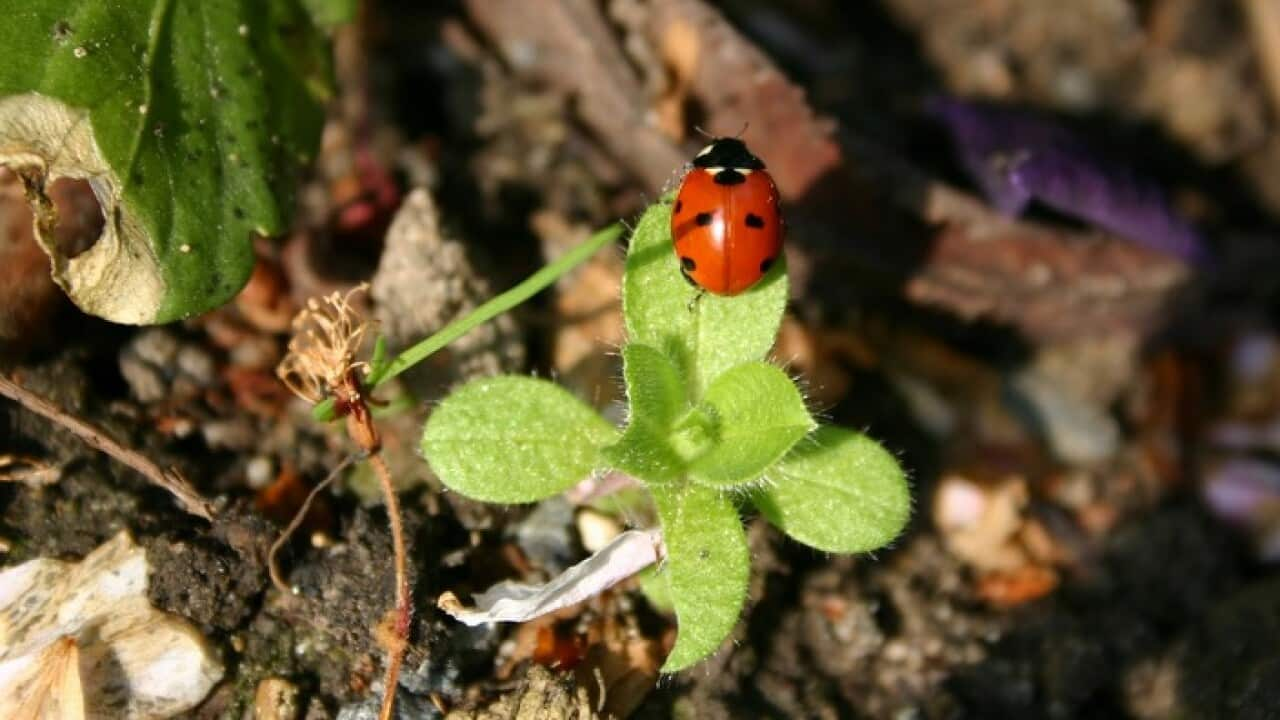English
Ladybirds, the source of several well-known superstitions, are thought across some cultures to bring good fortune.
With their distinctive polka dots, these tiny members of the beetle family come in multiple colours including red and yellow.
Now, one scientist is now trying their luck with them in the realm of Australia's agri-food industries.
Murdoch University PhD researcher Shovon Chandra Sarkar's has successfully managed to train ladybirds to eat pests, namely, the highly invasive potato psyllid.
"We bring them in our lab and we had a big colony of them. So yeah, from there I collect the psyllid and train them and then, mimic this experiment in the glasshouse area."
Mr Sarkar found when ladybirds were introduced to psyllids early enough into their life-cycle, they could learn to recognise them as their preferred prey.
On its own, the potato psyllid can cause crop yield losses of more than 50 per cent and can also spread a serious bacterial disease called 'zebra chip' in potato and tomato plants.
"When you cut the potato you can see the black and white and for the plant this psyllid can suck the chlorophyll, I think you know, that is used by plant to create, to make their food. So they're decreasing chlorophyll content from the plant and on the other way they also affect the potato itself."
Psyllids also feed on capsicum, chilli, goji berry, tamarillo, eggplant and sweet potato crops.
Mr Sarkar worked on two different lady bird types: one native to Australia coccinella transversalis and one non-native hippodamia verriegata.
"I worked on two lady birds. One is native to Australia and another one introduced in 2002 in Queensland, and now it's all over in Australia. They both are commercially available. That's why I chose these two, so the grower can buy from the company. Other ladybirds we did not try, maybe we can try in the future."
Both of these types of ladybirds can be bought by farmers online and Mr Sarkar says they can easily be trained to eat pests.
Doctor Mary Whitehouse is a behavioural ecologist at Macquarie University and says this could be highly beneficial.
"A number of different websites that -- a number of different suppliers of biological control agents, the products they include are ladybirds... It's interesting that the work that they, that that's been shown here has been trained to focus on psyllids. And that is interesting. So that would possibly, if you were to use that commercially, then you'd want to work with one of these suppliers of biological control agents to actually say that this -- the animals you were receiving had been trained on these pests."
Melbourne University Associate Professor Paul Umina, specialising in sustainable agriculture, says there's a couple of different ways in which farmers can use ladybirds, and other beneficial insects.
"I guess the first is, as you've mentioned, introducing these beneficial insects into a cropping system. So for example, there are a number of different commercial insectaries in Australia that actually breed up these beneficial insects, and they sell them to farmers, and so they can be bought, and they can be sent out to a particular farmer's property, and then they can release those beneficial insects into their particular cropping system. So that's a really effective way to achieve biological control. But of course, a lot of these beneficial insects already persist and are already present in a lot of our natural ecosystems already."
Professor Umina says it's a matter of preserving these beneficial insects that are already in Australia's cropping landscapes.
Scientists are increasingly turning to methods such as these as alternatives to agrichemicals, which often have reduced effectiveness as parassites develop resistance over time.
"Yeah, look, one of the, I guess the, the challenges that we face here in Australia, but perhaps also more broadly in other countries as well, is I guess we do use insecticides and indeed other pesticides in our farming systems. And as I mentioned, they're very effective. They work very well, but unfortunately sometimes the pests that we're actually trying to target evolve resistance to those chemicals. And so unfortunately that there presents a real dilemma for growers and for farmers because the chemicals that they were using to achieve pest control may no longer work. And so, you know, sometimes there are other chemicals that they might be able to choose as an alternative, but often, there may not be."
Doctor Whitehouse says using beneficial insects, like ladybirds, combined with multi-pronged, Integrated Pest Management approaches, could be used as alternatives to chemicals.
"I think it's great. I think what he's found suggests that you can target your beneficial on a particular prey. And I think there may be a use for that. So when you have augmenting a crop, you have a particular problem with the facilities, and you can buy in lady birds that have been raised on facilities or whose parents have been raised on, you know, the adult, the females have eaten facilities, so their offspring are more likely. That's what I think his research was suggesting then, and that could be very useful."
Italian
Le coccinelle, fonte di numerose note superstizioni, sono ritenute storicamente e in alcune culture portatrici di fortuna.
Con i loro caratteristici pois, questi minuscoli membri della famiglia dei coleotteri sono disponibili in diversi colori, tra cui il rosso e il giallo.
Ora uno scienziato sta tentando la fortuna con loro nel regno delle industrie agroalimentari australiane.
Il dottorando dell'Università di Murdoch Shovon Chandra Sarkar è riuscito ad addestrare le coccinelle a mangiare i parassiti, in particolare lo psillide della patata, altamente invasivo.
"We bring them in our lab and we had a big colony of them. So yeah, from there I collect the psyllid and train them and then, mimic this experiment in the glasshouse area."
Sarkar ha scoperto che quando le coccinelle vengono introdotte agli psillidi abbastanza presto nel loro ciclo di vita, possono imparare a riconoscerli come prede preferite.
Da solo, lo psillide della patata può causare perdite di raccolto superiori al 50% e può anche diffondere una grave malattia batterica chiamata “zebra chip” nelle piante di patate e pomodori.
"When you cut the potato you can see the black and white and for the plant this psyllid can suck the chlorophyll, I think you know, that is used by plant to create, to make their food. So they're decreasing chlorophyll content from the plant and on the other way they also affect the potato itself."
Gli psillidi si nutrono anche di colture di peperoni, peperoncini, bacche di goji, pomodoro arboreo, melanzane e patate dolci.
Sarkar ha lavorato su due diversi tipi di coccinelle: una nativa dell'Australia, coccinella transversalis, e una non nativa, hippodamia verriegata.
"I worked on two lady birds. One is native to Australia and another one introduced in 2002 in Queensland, and now it's all over in Australia. They both are commercially available. That's why I chose these two, so the grower can buy from the company. Other ladybirds we did not try, maybe we can try in the future."
Entrambi questi tipi di coccinelle possono essere acquistati dagli agricoltori online e Sarkar afferma che possono essere facilmente addestrati a mangiare i parassiti.
La dottoressa Mary Whitehouse, ecologista comportamentale presso la Macquarie University, sostiene che questo potrebbe essere molto utile.
"A number of different websites that -- a number of different suppliers of biological control agents, the products they include are ladybirds... It's interesting that the work that they, that that's been shown here has been trained to focus on psyllids. And that is interesting. So that would possibly, if you were to use that commercially, then you'd want to work with one of these suppliers of biological control agents to actually say that this -- the animals you were receiving had been trained on these pests."
Il professore associato dell'Università di Melbourne Paul Umina, specializzato in agricoltura sostenibile, sostiene che gli agricoltori possono utilizzare le coccinelle e altri insetti benefici in un paio di modi diversi.
"I guess the first is, as you've mentioned, introducing these beneficial insects into a cropping system. So for example, there are a number of different commercial insectaries in Australia that actually breed up these beneficial insects, and they sell them to farmers, and so they can be bought, and they can be sent out to a particular farmer's property, and then they can release those beneficial insects into their particular cropping system. So that's a really effective way to achieve biological control. But of course, a lot of these beneficial insects already persist and are already present in a lot of our natural ecosystems already."
Secondo il professor Umina, si tratta di preservare questi insetti benefici che sono già presenti nelle coltivazioni australiane.
Gli scienziati si stanno rivolgendo sempre più a metodi come questi come alternativa ai prodotti chimici, che spesso hanno un'efficacia ridotta perché i parassiti sviluppano resistenza nel tempo.
"Yeah, look, one of the, I guess the, the challenges that we face here in Australia, but perhaps also more broadly in other countries as well, is I guess we do use insecticides and indeed other pesticides in our farming systems. And as I mentioned, they're very effective. They work very well, but unfortunately sometimes the pests that we're actually trying to target evolve resistance to those chemicals. And so unfortunately that there presents a real dilemma for growers and for farmers because the chemicals that they were using to achieve pest control may no longer work. And so, you know, sometimes there are other chemicals that they might be able to choose as an alternative, but often, there may not be."
La dottoressa Whitehouse sostiene che l'uso di insetti benefici, come le coccinelle, combinato con approcci di gestione integrata dei parassiti su più fronti, potrebbe essere utilizzato come alternativa ai prodotti chimici.
"I think it's great. I think what he's found suggests that you can target your beneficial on a particular prey. And I think there may be a use for that. So when you have augmenting a crop, you have a particular problem with the facilities, and you can buy in lady birds that have been raised on facilities or whose parents have been raised on, you know, the adult, the females have eaten facilities, so their offspring are more likely. That's what I think is research was suggesting then, and that could be very useful."




